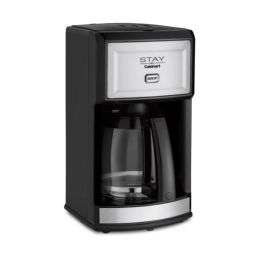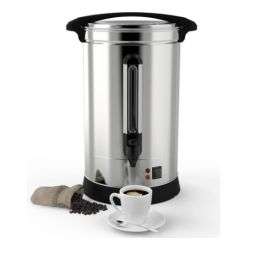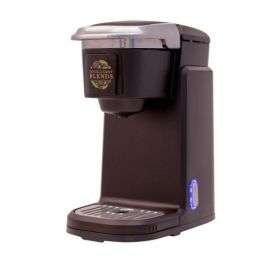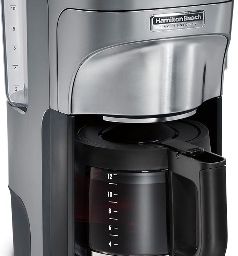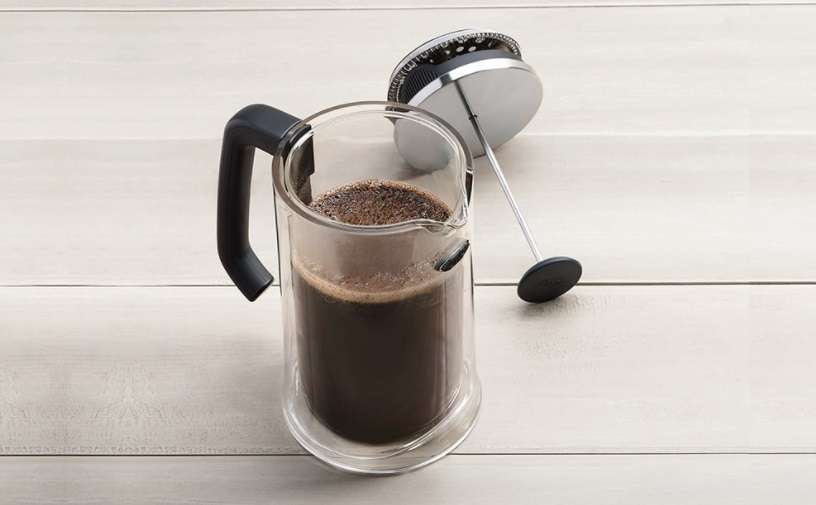
Can you use instant coffee in a French press? It’s a question that might seem straightforward at first glance, but there’s more to it than meets the eye. While the French press is traditionally designed for coarsely ground coffee, the convenience of instant coffee can be tempting. This exploration sheds light on whether you can merge the quickness of instant coffee with the craft of French press brewing, providing a nuanced answer to this curious coffee conundrum.
Key Takeaways
- Instant Coffee in a French Press: Yes, you can use instant coffee in a French press, though it’s not the ideal choice. The fine grind of instant coffee isn’t tailored for the French press’s brewing method, which is designed for coarser grinds.
- Opt for Instant Espresso Powder: If you’re set on using instant coffee, go for instant espresso powder. It’s a better fit for the French press, offering a richer flavor compared to regular instant coffee.
- Optimizing Your Brew: To get the most out of your instant coffee in a French press, pay close attention to the steeping time, water temperature, and coffee-to-water ratio. These elements are key to brewing a cup that’s enjoyable rather than just passable.
Understanding French Press Coffee
The French press, also known as a press pot or plunger pot, is beloved by coffee aficionados for its straightforward brewing process and the rich, full-bodied coffee it produces. But what makes the French press particularly special, and why is coarsely ground coffee the go-to choice for this brewing method? Let’s break it down.
The Brewing Process
The French press consists of a cylindrical beaker and a plunger with a built-in filter screen. Brewing coffee with a French press involves just a few key steps:
- Add Coffee: Start by adding coarsely ground coffee to the empty beaker. The coarse grind is crucial here, as finer grinds can slip through the filter and into your cup, leading to a gritty brew.
- Pour Hot Water: Next, pour hot water (just off the boil) over the coffee grounds. This initiates the brewing process, where the hot water extracts flavors and oils from the coffee.
- Stir: Give the mixture a gentle stir to ensure all the coffee grounds are saturated with water, promoting an even extraction.
- Steep: Allow the coffee to steep for about four minutes. This duration is ideal for extracting the right balance of flavors without over-extracting, which can lead to bitterness.
- Plunge: Finally, press the plunger down slowly, separating the grounds from the liquid. This action stops the extraction process and prepares your coffee for serving.
Why Coarsely Ground Coffee?
The choice of coarsely ground coffee isn’t arbitrary. The French press’s filter is designed to trap larger particles while allowing the coffee’s oils and some fine particles (known as ‘fines’) to pass through, contributing to the brew’s body and flavor profile. Fine grinds would not only pass through the mesh, muddying your cup, but they would also over-extract quickly, resulting in a bitter taste.
The Nature of Instant Coffee
Instant coffee offers a quick caffeine fix with minimal fuss, but have you ever wondered how those granules or powders come to be? Understanding the process behind instant coffee and how it compares to regular coffee grounds can give you insight into why it behaves differently in a French press.
How Instant Coffee Is Made
The journey of instant coffee begins much like any coffee, with the roasting of green coffee beans. After roasting, the beans are ground and brewed into a concentrated coffee extract. The magic happens in the next steps:
Drying: The coffee extract is dried through one of two methods – spray drying or freeze-drying. Spray drying involves blasting the coffee extract with hot air, quickly evaporating the water and leaving behind fine coffee powder. Freeze-drying, on the other hand, freezes the extract before breaking it into granules and drying them under a vacuum.
Granulation: The resulting product is then granulated into the familiar crystals or powder. This form of coffee dissolves when added to hot water, making it an ultra-convenient option for coffee drinkers.
Comparing Instant and Regular Coffee
- Flavor and Aroma: Instant coffee generally lacks the depth and range of flavors you find in freshly brewed coffee from grounds. The drying processes, especially spray drying, can lead to a loss of some volatile compounds responsible for coffee’s rich aroma and taste.
- Convenience: Instant coffee’s main advantage is its convenience. There’s no need for brewing equipment – just hot water, and you’re set. This contrasts with regular coffee grounds, which require specific brewing methods, like a French press, to extract their flavors.
- Texture: Regular coffee grounds, particularly when used in a French press, release oils and fine particles into the brew, contributing to a richer body and texture. Instant coffee dissolves completely, often resulting in a lighter body.
- Freshness: Freshly ground coffee used in a French press is just that – fresh. It retains more of its natural flavors and oils. Instant coffee, due to its processing, can have a longer shelf life but at the cost of some flavor and aroma degradation over time.
Pros and Cons of Using Instant Coffee in a French Press
Pros:
- Convenience: The most significant advantage of using instant coffee in a French press is convenience. It eliminates the need for grinding beans or measuring out coffee grounds.
- Quick: Instant coffee dissolves quickly, reducing the overall time needed to make a cup of coffee.
- Cost-Effective: Generally, instant coffee can be less expensive than whole or ground coffee beans.
Cons:
- Flavor Sacrifice: Instant coffee doesn’t provide the same depth of flavor as freshly ground coffee. The nuances of the coffee’s origin and roasting are often lost in the instant coffee process.
- Texture: A French press is known for its ability to extract oils and fines from coffee grounds, contributing to a rich texture. Instant coffee, being a finer powder, doesn’t offer this same richness and can even pass through the press filter, leading to sediment in your cup.
- Health Aspects: Instant coffee has been found to contain higher levels of acrylamide, a chemical that forms during the roasting process and has raised health concerns.
How to Brew Instant Coffee in a French Press
- Heat the Water: Start by heating your water to just below boiling, around 200°F (93°C).
- Add Instant Coffee: Place two teaspoons of instant espresso powder into the French press. Espresso powder is recommended for a richer flavor.
- Pour Water: Slowly pour the hot water over the instant coffee in the French press. Stir gently to ensure the coffee dissolves completely.
- Steep: Even though it’s instant coffee, allow it to sit for a minute or two. This brief time helps develop the flavor more fully than just mixing with water in a cup.
- Plunge Gently: Press the plunger down slowly. Even though there are no grounds to filter, this action helps mix the coffee evenly.
- Serve: Pour your coffee into a cup and enjoy. Instant coffee in a French press won’t have the same body or texture as brewed coffee, but it’s a quick and easy way to get a slightly enhanced flavor from your instant coffee.
FAQs
How long should I steep instant coffee in a French press?
Even though it’s instant coffee, allow it to steep for about 1-2 minutes in a French press to enhance its flavor slightly.
Will instant coffee in a French press taste like regular French press coffee?
No, instant coffee won’t offer the same depth and richness as coffee brewed from freshly ground beans in a French press. The flavor will be closer to a standard cup of instant but with a slight improvement.
Does using instant coffee in a French press affect its caffeine content?
No, the caffeine content will remain similar to what’s listed for the instant coffee used. The brewing method doesn’t alter the caffeine level in this case.
Can I reuse the instant coffee grounds in a French press?
Instant coffee dissolves completely and doesn’t leave grounds for reuse. Once brewed, there’s nothing left to extract.
Final Thoughts
Using instant coffee in a French press is a unique blend of convenience and traditional brewing. While it won’t replicate the full experience of a French press, it can slightly enhance the flavor of instant coffee, offering a middle ground for those seeking quickness without completely sacrificing taste. Remember, if you’re after the true French press experience, freshly ground coffee is the way to go. However, for those moments when time is of the essence, instant coffee in a French press can be a satisfactory alternative.




